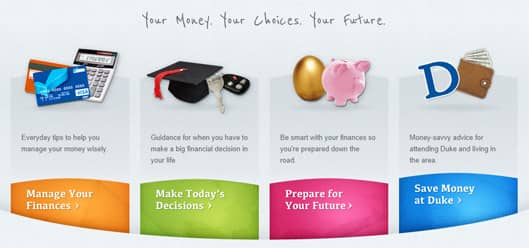

In a nutshell: The Personal Finance @Duke program offers a comprehensive collection of articles, tools and advice to help students and alumni learn basic money management skills and make responsible financial decisions.
In the spring of 2011, the administrators at Duke University’s Financial Aid and Student Loan Offices received a heartfelt email from an alum:
“I will be turning 26 in three days, and I have just now learned the importance of saving and budgeting,” she wrote. “Both I and students who have attended Duke may have been even more grateful if… a course was taught on the practicalities of the world that seniors will soon be embarking on.”
With the nation’s outstanding student debt at $1 trillion and growing, many students and alumni share her sentiment and face unique challenges when it comes to building credit, balancing debt and starting their careers.
Duke University took the alum’s plea to heart and formed Personal Finance @Duke, a website dedicated to helping students make healthier money decisions and master their finances at an early age.
“We realized Duke needs a personal finance resource for our students,” said Sherrie Clayton, assistant director of Accounting and Educational Services at Duke’s Student Loan Office. “There was no one out there teaching our students how to budget, read their credit report or understand the difference between saving and investing.”
“There was no one out there teaching our students how to budget, read their credit report or understand the difference between saving and investing.”
Helping Students Learn Personal Finance Basics
With typical incoming freshmen having little to no personal finance experience, Clayton sees many students with the same misconceptions and making the same mistakes.

Personal Finance @Duke covers a wide range of topics and helps students master the financial fundamentals.
“They don’t really know the difference between a credit report and a credit score… they think they’re one and the same,” she said. “Or they may not have a plan to repay their student loans. They don’t have any idea how much their payment will be and if their salary could support that.”
Personal Finance @Duke starts with the basics: budgeting, credit cards, credit scores, identity theft and taxes. Each section breaks down a topic to its fundamental elements and includes helpful tools students may need.
For example, the section on credit scores asks the same questions many undergrads ask: What is a credit score, and why does it matter? How is it calculated? How do I improve it?
Each section also will have a series of helpful links and resources, such as financial calculators and articles from authority sites in the personal finance industry.
Preparing Students for Financial Responsibilities
Once students have a firm grasp of basic financial principles, they’re encouraged to move on to more nuanced and long-term topics. Additional topics in the “Make Today’s Decision” section help students figure out how to become car and homeowners and how to figure out various types of insurance.
But what Clayton wants students to learn most of all is responsibility when it comes to paying back their student loans.
“We want them to understand that this is a loan and that they do have to pay it back,” she said. “We have one of the lowest default rates in the country [1.1 percent], so our students are pretty well-versed on their loans. Although there are some who slip through the cracks, we just want to make sure they’re getting all the information they can get before they take out any additional loan debt.”
“We want them to understand that this is a loan and that they do have to pay it back…to make sure they’re getting all the information they can.”
Regardless of future liabilities, Duke administrators realize their students need time to unwind from their strenuous studies and include a directory of entertainment and activities that cost little to no money. The site itself is an excellent directory of cheap/no-cost activities and events, such as local microbrew tours, art walks, concerts and more.
Bringing Financial Literacy to Durham
Clayton and others are coordinating in-person events, such as workshops and seminars, to supplement the materials on the Personal Finance @Duke site. They’ve also are reaching out to their hometown community of Durham, North Carolina, for additional financial literacy efforts.
 “We have a student group called Duke/Durham Saves, which is connected with AmericaSaves.org,” Clayton said. “Their focus is mainly the Durham community. They have partnerships with the YMCA and Boys & Girls Club, teaching them about different personal finance issues. They go out to Durham public schools and hold sessions on budgeting, savings and other topics.”
“We have a student group called Duke/Durham Saves, which is connected with AmericaSaves.org,” Clayton said. “Their focus is mainly the Durham community. They have partnerships with the YMCA and Boys & Girls Club, teaching them about different personal finance issues. They go out to Durham public schools and hold sessions on budgeting, savings and other topics.”
In the coming months, students will have a more direct role in the university’s personal finance efforts. Students are being trained to hold the workshops themselves and conduct peer counseling sessions.
Photo credits: byuaccounting.net, Duke University
Advertiser Disclosure
BadCredit.org is a free online resource that offers valuable content and comparison services to users. To keep this resource 100% free for users, we receive advertising compensation from the financial products listed on this page. Along with key review factors, this compensation may impact how and where products appear on the page (including, for example, the order in which they appear). BadCredit.org does not include listings for all financial products.
Our Editorial Review Policy
Our site is committed to publishing independent, accurate content guided by strict editorial guidelines. Before articles and reviews are published on our site, they undergo a thorough review process performed by a team of independent editors and subject-matter experts to ensure the content’s accuracy, timeliness, and impartiality. Our editorial team is separate and independent of our site’s advertisers, and the opinions they express on our site are their own. To read more about our team members and their editorial backgrounds, please visit our site’s About page.




